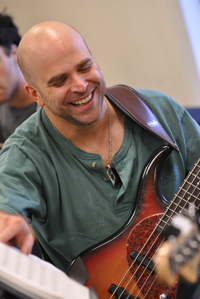"I focus on teaching my students a diversity of styles, because I myself am somewhat of a 'chameleon.' I play a mix of jazz, rock, r&b, and fusion, and that's why I get the work I do. I tell my students to shoot as high as possible for their dreams, but if they want to make a living with the bass—and aren't in a famous rock band—they're going to have to be able to play a lot of different styles."
"My teaching style is very direct. I don't make it personal, but I do say it the way I see it. If I'm sometimes a little too blunt, it's because I feel that I owe students the truth. But I always add, 'The good news is this is what you can do.' I also tell them, 'This is not about talent; this is about work.' A lot of this comes from my father, who played percussion with the Boston Symphony Orchestra. He was my first teacher, and I learned so much music from him."
"My style is holistic in the sense that I use a lot of analogies to connect the music and what students are learning to life itself. And I feel that, in order for students to really learn from you, you have to show that you really want to be there and that you're interested in your students as musicians and as people. Nothing fosters learning more than feeling comfortable and accepted. The greatest teacher I ever had, Charlie Banacos, was a master of that. He made you feel like you were the only student in the world."
"It's important that my students understand the importance of practicing what they are weakest at instead of repeating what they are strongest at. It's normal for people to try to disguise or work around their weak points, and musicians—including myself—are like that with their playing. I explain to students that all musicians have weaknesses, and that they'll always be weaker in some things. But you have go into the weakness, rather than running away from it."
"Your sound—how you sound when you hit that string—is everything. And as long as you have the fundamental elements, you have everything you need to sound great. Also, if you've had good training, and understand rhythm and harmony, you're free to explore everything—to pick up a new style just by putting on a CD and listening to it."
"I love it when a student makes a connection with the instrument, when they have an 'aha' moment. It almost seems to happen in one day: snap, they just connect with why they're learning what they're learning and how everything at Berklee is connected. Everything. There's no random information here."

